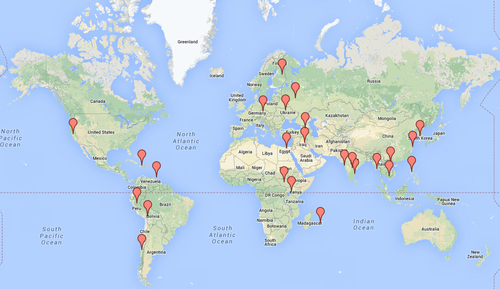Coursera Launches Learning Hubs - Physical Facilities for Online Courses
Quote from Coursera's blog:
Coursera has announced the opening of such learning hubs in many cities around the world. In the beginning, it is planned to open 27 centers, including in Moscow and Kiev . But, at this time, specific addresses of such centers are not provided.
Original post from Coursera .
But I wrote this post not just to share the news. I see in this event a turning point in the entire system of higher education.
Cities of the world where the first hubs will be opened.

Some time ago I published an article on Habré about how I see the higher education system in the future . One of my predictions was just such “places for learning” where local students of online courses will teach their courses.
In my MyEducationPath.com project, I created a Places to Study section where I want to publish places for independent learning. Currently, there is only one place - MOOCCampus. But soon there will be another 27 - hubs from Coursera.
The importance of the appearance of such hubs is actually huge. Critics of open courses love to say that online courses cannot replace traditional education. After all, education is not only a theoretical study of the material. But the emergence of physical places like hubs from Coursera solves part of this problem.
I am sure that as soon as the hubs start working, they will have physical, chemical, biological and other educational laboratories for students of online courses. And the problem of the lack of practical training in online learning will be solved.
But in fact, for me it is not entirely clear how all this will work for free for a student. Who will finance? There are suggestions that Coursera will “sell heads”, that is, merge information from talents to corporations, and those in turn will hunt the best heads in their companies. But this is only speculation.
Another question that I am very interested in is it possible to teach opening courses from other providers in such places. On the one hand, it is not profitable for Coursera. On the other hand, how to control what a group of students is currently teaching?
P.S. If interested, here is my article about the future of higher education and about my project MyEducationPath.com
At Coursera, we envision a future in which everyone has access to world-class education. We try to find and share ways to overcome barriers that stand in the way of successful learning. Today, we are announcing the new Learning Hubs initiative - which will provide people around the world with a physical space where they can access the Internet to enroll in a Coursera course and learn with their peers. Everything is completely free.
Coursera has announced the opening of such learning hubs in many cities around the world. In the beginning, it is planned to open 27 centers, including in Moscow and Kiev . But, at this time, specific addresses of such centers are not provided.
Original post from Coursera .
But I wrote this post not just to share the news. I see in this event a turning point in the entire system of higher education.
Cities of the world where the first hubs will be opened.

What does this event mean for the traditional higher education system.
Some time ago I published an article on Habré about how I see the higher education system in the future . One of my predictions was just such “places for learning” where local students of online courses will teach their courses.
In my MyEducationPath.com project, I created a Places to Study section where I want to publish places for independent learning. Currently, there is only one place - MOOCCampus. But soon there will be another 27 - hubs from Coursera.
The importance of the appearance of such hubs is actually huge. Critics of open courses love to say that online courses cannot replace traditional education. After all, education is not only a theoretical study of the material. But the emergence of physical places like hubs from Coursera solves part of this problem.
I am sure that as soon as the hubs start working, they will have physical, chemical, biological and other educational laboratories for students of online courses. And the problem of the lack of practical training in online learning will be solved.
But in fact, for me it is not entirely clear how all this will work for free for a student. Who will finance? There are suggestions that Coursera will “sell heads”, that is, merge information from talents to corporations, and those in turn will hunt the best heads in their companies. But this is only speculation.
Another question that I am very interested in is it possible to teach opening courses from other providers in such places. On the one hand, it is not profitable for Coursera. On the other hand, how to control what a group of students is currently teaching?
P.S. If interested, here is my article about the future of higher education and about my project MyEducationPath.com
